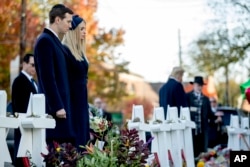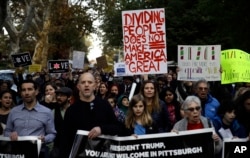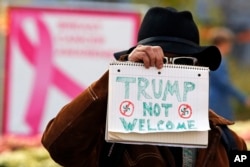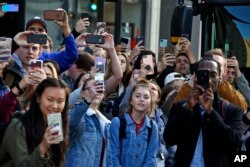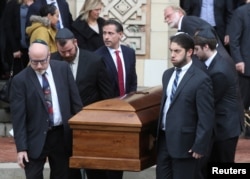President Donald Trump and first lady Melania Trump visited the Tree of Life synagogue in Pittsburgh, where a gunman massacred 11 worshippers during Saturday's Sabbath prayers.
Trump shook hands with the synagogue's Rabbi Jeffrey Myers and Israeli ambassador to the U.S., Ron Dermer.
Trump's son-in-law, Jared Kushner — wearing a Jewish skullcap — and daughter Ivanka Trump, who converted to Judaism when she married Kushner, accompanied the president.
Donald and Melania Trump placed a stone at each of the 11 Stars of David set up outside the synagogue. Placing stones at a grave or remembrance site is an ancient Jewish tradition.
"The president was very moved by the visit and his time with the rabbi and called it very humbling and sad," White House spokeswoman Sarah Sanders told reporters.
Protesters
A large crowd of protesters opposed to Trump's visit marched nearby. Many chanted "turn your backs," anticipating the president's motorcade would pass by.
Trump also met at the hospital with three police officers who were wounded in the synagogue shooting and the doctors who treated them.
The president later spent an hour talking with Peg Durachko, whose husband, Dr. Richard Gottfried, was among the 11 killed.
"She said she wanted to meet the president to let him know that people wanted him there," Sanders said.
But the demonstrators, along with some politicians and Jewish leaders, wanted Trump to stay away from Pittsburgh until he firmly denounces white nationalism.
They believe his comment that there were "some very fine people" among neo-Nazis who marched in Charlottesville, Virginia, last year, along with his indictments of the news media and immigrants, incite those on the extreme right to use violence.
Pittsburgh's Mayor William Peduto, a Democrat, also said Trump should not visit the city while families are holding funerals.
"If the president is looking to come to Pittsburgh," Peduto said, "I would ask that he not do so while we are burying the dead." Peduto's office said the mayor does not plan to meet with Trump.
Top congressional leaders from both political parties declined invitations from Trump to join him in visiting, while the family of one of the victims is refusing to meet the president. The family said it felt Trump's statement suggesting that an armed guard stationed at the synagogue might have prevented the attack was inappropriate.
Robert Bowers, the 46-year-old truck driver accused of carrying out the attack, made his first appearance before a federal judge Monday.
Authorities accuse Bowers of carrying out the rampage out of vitriolic hatred of Jews, posting anti-Semitic tirades online and screaming "All Jews must die!" as he opened fire.
Bowers faces 29 federal charges, including some federal hate crimes. He could face the death penalty if he is convicted.
The Anti-Defamation League, which has tracked hatred and violence against Jews since the 1970s, said the Pittsburgh mayhem was the worst attack against the Jewish community in U.S. history.
Funerals
Meanwhile, the first victims of the massacre were buried Tuesday.
About 1,800 people turned out for the funerals of Cecil and David Rosenthal — two mentally challenged adult brothers who were mainstays at the Tree of Life. They were called "gentle giants," passing out prayer books, cheerfully greeting all familiar worshippers at the synagogue, and giving warm welcomes to newcomers.
Several members of the Pittsburgh Steelers football team were at their funeral.
About 2,000 mourners came for the funeral of Dr. Jerry Rabinowitz. He was known for being accessible for friendship and medical advice around the clock and was always willing to make personal sacrifices for his patients.
He was rarely seen without a colorful bowtie and was remembered as one of the first Pittsburgh doctors unafraid to treat AIDS patients when little was known about the disease.
Another victim, Daniel Stein, who had just become a grandfather, was also mourned Tuesday in a private ceremony.





